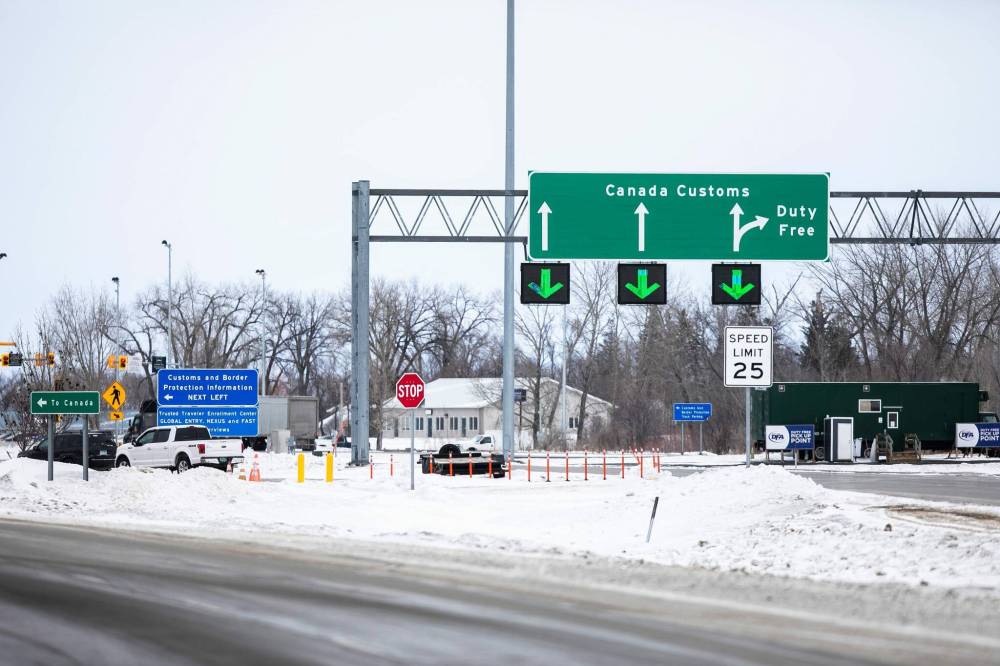Ghost town U.S.A. Manitoba traffic to North Dakota takes hit due to trade war, rising Canadian patriotism
Read this article for free:
or
Already have an account? Log in here »
To continue reading, please subscribe:
Monthly Digital Subscription
$0 for the first 4 weeks*
- Enjoy unlimited reading on winnipegfreepress.com
- Read the E-Edition, our digital replica newspaper
- Access News Break, our award-winning app
- Play interactive puzzles
*No charge for 4 weeks then price increases to the regular rate of $19.00 plus GST every four weeks. Offer available to new and qualified returning subscribers only. Cancel any time.
Monthly Digital Subscription
$4.75/week*
- Enjoy unlimited reading on winnipegfreepress.com
- Read the E-Edition, our digital replica newspaper
- Access News Break, our award-winning app
- Play interactive puzzles
*Billed as $19 plus GST every four weeks. Cancel any time.
To continue reading, please subscribe:
Add Free Press access to your Brandon Sun subscription for only an additional
$1 for the first 4 weeks*
*Your next subscription payment will increase by $1.00 and you will be charged $16.99 plus GST for four weeks. After four weeks, your payment will increase to $23.99 plus GST every four weeks.
Read unlimited articles for free today:
or
Already have an account? Log in here »
Hey there, time traveller!
This article was published 07/03/2025 (258 days ago), so information in it may no longer be current.
The long lines of passenger and commercial vehicles at the Canada-U.S. border south of Emerson had just started to return after the desolation of the pandemic.
“Trucks would be lined up by the dozens, sometimes by the hundreds, and that’s standard down here,” said Simon Resch, owner of the Emerson Duty Free shop, on Friday.
But now, ever since U.S. President Donald Trump started a trade war, which sparked patriotism north of the border and a rallying cry to shun the States, the all-too-familiar deserted-town feeling has returned.
The duty-free store, which relies on southbound traffic, has experienced a massive drop in sales.
“Now, it’s literally like a ghost town. I have never seen the highway and this border as quiet as it has been this week.”
The difference this time is the decrease of truck traffic.
“The absence of the (semi) trucks is eerie,” he said.
“I have never seen the highway and this border as quiet as it has been this week.”–Simon Resch
In 2023, cross-border commercial traffic at the Emerson-Pembina port of entry was worth $31 billion.
In August, passenger flow finally returned to pre-pandemic levels.
The Trump administration’s chaotic imposition of tariffs and corresponding anti-American sentiment in Canada, including a boycott of travel south of the border, has destabilized that progress.
‘Perfect storm’: trucking industry
The Manitoba Trucking Association said its members feel the pinch.
Aaron Dolyniuk, executive director, said Friday there has been a 20 to 30 per cent decrease in business across the board, some segments of the trucking industry have been hit by as much as an 80 per cent drop.
It couldn’t come at a worse time, he said. The industry is experiencing a downturn that some have compared to the 2008 recession, which was catastrophic.
“I’ve heard a lot of companies refer to the last couple of years as just as challenging, if not more so, than 2008,” Dolyniuk said. “Now, coming into these uncertain times, it’s somewhat of a perfect storm for our industry.”
JOHN WOODS / THE CANADIAN PRESS FILES Since U.S. President Donald Trump started a trade war with Canada, which sparked patriotism north of the border and a rallying cry to shun the States, a deserted-town feeling has returned to the border crossing at Emerson.
Companies are struggling to stay in the black, and with the current uncertainty of on-again, off-again tariff threats, it’s having a large impact.
“It has the potential to become very disruptive,” Dolyniuk said.
Eliminating trade barriers between the provinces would provide relief, he said.
“It would help keep the wheels moving,” he said. “It would remove a lot of red tape and would allow for a standardized and simplified movement of goods.”
‘Hopefully this ends’: Grand Forks chamber
In terms of the hospitality sector, Barry Wilfarht, president and CEO of the Greater Grand Forks Chamber of Commerce, said there’s been a noticeable decrease in Canadian visitors.
“From a community perspective, we’re hopeful our two countries can resolve this tariff situation and get to the table,” Wilfarht said. “Hopefully, this ends sooner rather than later.”
The mayor of Fargo, 130 kilometres south of Grand Forks, said he would love to influence Trump’s decision making. Tim Mahoney said he’s received many emails from Canadians who used to frequent his city, but no longer will.
“I’m very upset about it,” Mahoney said. “We very much enjoy our relationship we’ve had in the past and we find Canadians are very respectful and enjoy our community, our businesses, our retail space.”
MIKAELA MACKENZIE / FREE PRESS FILES In 2024 the number of Canadians who crossed into North Dakota increased by 10 per cent — but is still well behind pre-pandemic numbers.
Mahoney said he believes Canada does a “very good job” to keep the border safe, and feels the country should be given credit for that. The stated reason for Trump’s tariffs is fentanyl shipments that slip into the U.S. from Canada.
“Your neighbour next to you, you want them to do well,” Mahoney said. “You don’t want them to lose their job or their house or something else.”
Mahoney doesn’t blame Canadians for staying home: “I believe they should stand up and speak for their rights.”
Mahoney said the tariff battle extends to businesses that are important to keep his city running.
“Homebuilders here have told me that if the tariffs go into effect, lumber (prices) will jump 40 per cent, and that hits my housing industry quite hard,” he said.
North Dakota delays tourism campaign
On Friday, CNH Industrial, a tractor manufacturer in Fargo, laid off nearly 200 people at its Case New Holland manufacturing plant, citing “current and anticipated” market conditions.
At North Dakota Tourism, marketing director Sara Otte Coleman, said they cannot project just how much the political climate will hurt Canadian visitation numbers.
In 2024, she said, the number of Canadians who crossed into North Dakota increased by 10 per cent — well behind pre-pandemic numbers. The number of private vehicle crossings were just 78 per cent of what they were in 2019.
Data from North Dakota Tourism showed sharp declines in inquiries about tourism beginning in October, and a steep drop in visits to the organization’s website from last August.
“We have delayed our paid marketing in Canada until we can better understand the sentiment about travelling to North Dakota,” Coleman said in an email on Friday.
“We value our Canadian visitors. Many have become friends as repeat visitors, and our communities and businesses hope to see them continue to travel to North Dakota.”
scott.billeck@freepress.mb.ca

Scott Billeck is a general assignment reporter for the Free Press. A Creative Communications graduate from Red River College, Scott has more than a decade’s worth of experience covering hockey, football and global pandemics. He joined the Free Press in 2024. Read more about Scott.
Every piece of reporting Scott produces is reviewed by an editing team before it is posted online or published in print — part of the Free Press‘s tradition, since 1872, of producing reliable independent journalism. Read more about Free Press’s history and mandate, and learn how our newsroom operates.
Our newsroom depends on a growing audience of readers to power our journalism. If you are not a paid reader, please consider becoming a subscriber.
Our newsroom depends on its audience of readers to power our journalism. Thank you for your support.














